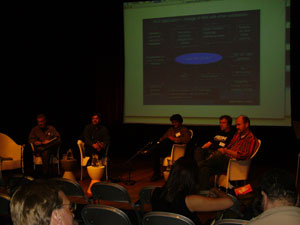Chair: Ravi Sundaram (Sarai, India)
With contributions by: Enrique Chaparro (Fundacion Via Libre, Argentina); Glenn Tarman (Trade Justice Campaign, UK) – Join the band: ICTs, popular mobilization and the global call to make poverty history; Steve Cisler (librarian, USA) – PPPP: problems of public private partnerships; Shudda Sengupta (Sarai, India) – Knowing in your bones: Politics, Anxiety and Information in Delhi, 2005.

What is the status of aid in the promotion of ICT4D, and how have ICT4D actors responded to the politicization and securization of aid, including the sale of security and surveillance technologies in the name of info-development? To what extent does info-development overlap with new info-infrastructures in the field of humanitarian aid (ICT4Peace)? Are global trade justice campaigns a response to classic development schemes?
Ideas of digital restrictions.
Enrique:
The rhetoric goes that there is more control needed to take the bad guys. But terrorists are not going to use their own home ip – address for their activities.
Telecommunications law: regulations of telecommunication in order to intercept every communication in the name of the holly “security”.
People think a wire tap is natural thing… but the same people would be alarmed if their physical correspondence would be checked by the government.
This asks huge amounts of resources. Also the internet traffic analysis give a lot of information. Who are you at what time… how many parts of information are you distributing on the internet.
Profiling is supposed to detect terrorists, but too often it is used for other uses.
Issue: A lot of effort is going to investigate how to enforce control and by that create economic advantages for highly concentrated media conglomerates who are the content providers.
Question: How has 9/11 changed this? It is becoming stricter, you need your id everywhere. Not so many changes at the surface but a lot is going on at an infrastructural level. There also is a lot of campaigning around the problem of surveillance.
Steve:
Sees himself as outside the church of ICT. Lives in silicon valley.
Research in silicon valley after 9/11 has been concentrated at unmanned vehicles like the predator in Jemen and Afghanistan.
The enormous bandwidth needed by the military to watch the people in the field.
He worked for apple computer which was like a cult. Cults aren’t necessarily a bad thing. He saw himself as an evangelist. At apple there seemed to be a whole department of evangelists.
He talked about the religious experience in silicon valley and cited some authors that wrote about this religion in the ICT field.
Steve addressed the issue of people that are against technology. E.G. the Amish, some activists, indigenous groups, people threatened by automation etc.
He did a lot of work in talking to people who weren’t using the net.
He had been a long time off line which is in fact a non issue for those who aren’t connected.
Talked to people who are on and off line and came in contact with on line people helping off line people.
Shudda:
What happened after 9/11in terms of surveillance had already happened earlier. 9/11 was an opportunity to translate these issues into action.
There is the shadow of an earlier technology. Fingerprinting etc are inherits of late nineteenth century.
We also should be careful of the idea that spaces of poverty are spaces of technological absence. It may not exist for people to use it according to their own means but it does exist for them to be controlled.
Multi purpose national identity project.
as a form of surveillance.
Important factor in many situations of violence, e.g the genocide in Rwanda. This shows clearly the multipurpose of ID cards. (This also speaks against the premise that there is no technology in poor areas)
In the discussion was stated that we could also try to be less Orwellian. There are also some positive features of the surveillance technologies, e.g. the control of police abuse in the Brazilian slums.
Glenn:
Glenn is an ICT outsider, a campaigner full time. He took some time out and now is back to check what everybody is doing.
For him ICT4D lies in the organisation of the justice movement. Here he sees a lot of potential for an active participation in development through ICTs.

